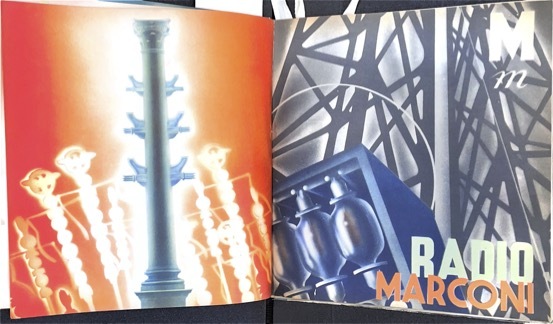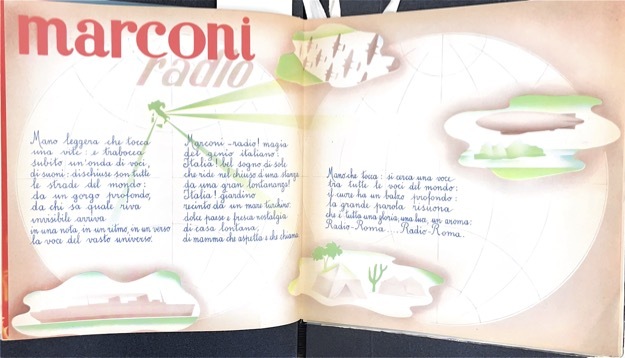M is for Marconi (Radio)
The use of Marconi for the letter M is interesting as it engages with themes of nationalism and propaganda through the lens of scientific achievement. Guglielmo Marconi (1874-1937), was an Italian inventor, most known for inventing the radio. Specifically, Marconi is known for his work in the development of long-distance radio transmission. In 1901, Marconi made history by successfully transmitting radio signals across the Atlantic Ocean, which marked a significant turning point in the history of communication and demonstrated the potential of radio as a means for global communication. This eventually earned him a Nobel prize in 1909, making him the first Italian to receive this honor. This is quite notable as Itay at this point was not recognized as technologically advanced, compared to other European countries. In fact, much of the country, particularly in the south, was uneducated and underdeveloped. While propaganda is often militaristic in nature, here the Italian fascists are clearly looking to broaden immigrant children’s sense of nationalism. It is important to note that Italy (especially at this time) was not known to be technologically advanced, and that much of the country, especially in the south, was uneducated and lacked proper infrastructure.
However, the use of Marconi in this book goes beyond solely his technological innovation as a symbol of Italy’s greatness. While its military use is certainly worth noting, the radio was an integral tool of the fascist regime in disseminating propaganda in Italy. Whereas prior to this, state propaganda was performed through print media and speeches, the radio allowed for immediate mass spread of state information, directly into the homes of Italian citizens. Marconi had close connections to the fascist party starting in the early 1920s, and was an important asset to the movement. He was integral in implementing it politically, and was given the title “Marchese” (Marquis) by Mussolini and was subsequently appointed as President of the Royal Academy of Italy. By 1938, approximately thirty-three percent of Italian radio was dedicated to explicit state propaganda. Marconi’s work was much more than Italian scientific achievement, it was a means of uniting the country under one leader, Mussolini. The radio was deemed as the main achievement of the fascist revolution, making it clear why the authors of this book chose to include it as the letter M.
|
Transcription: Mano leggera che tocca Una vite: e trabocca Subito un’onda di voci, Di suoni: dischiuse son tutte le strade del mondo: Da un gorgo profondo, Da chi sa quale riva Invisibile arriva In una nota in un ritmo, in un verso La voce del vasto universo. Marconi - radio! Magia Del genio italiano: Italia! Giardino recinto da un mare turchino: Dolce paese e fresca nostalgia Di casa lontana, Di mamma che aspetta e che chiama. Mano che tocca: si cerca una voce Tra tutte le voci del mondo: Il cuore ha un balza profondo: La grande parola risuona Che è tutta una gloria, una luce, un aroma: Radio-Roma… Radio-Roma. |
Translation: Light hand which touches A screw: and overflows Immediately a wave of voices, Of sounds: all roads of the world are opened: From a deep whirlpool, From who knows what shore Invisible arrives In a note, in a rhythm, in a verse The voice of the vast universe. Marconi - radio! Magic Of Italian genius: Italy! Garden enclosed by a turquoise sea: Sweet country and fresh nostalgia For a distant home, For a mother who waits and calls. Hand that touches: a voice is sought Among all the voices of the world: The heart has a profound leap: The great word resounds That all a glory, a light, an aroma: Radio-Rome… Radio-Rome. |
Works cited and further readings:
Cannistraro, Philip V. "The Radio in Fascist Italy." Journal of European Studies, vol. 2, no. 2, 1972, pp. 127-154.
"Marconi, Guglielmo." Oxford Reference, Oxford University Press, www.oxfordreference.com/display/10.1093/acref/9780192800916.001.0001/acref-9780192800916-e-1079. Accessed 12 Mar. 2024.
Luconi, Stefano. “Radio Broadcasting, Consumer Culture, and Ethnic Identity among Italian Americans in the Interwar Years.” Italian Americana, vol. 20, no. 2, 2002, pp. 150–59. JSTOR, http://www.jstor.org/stable/29776797. Accessed 13 Mar. 2024.
Page contributor:
Simon Lanzoni

